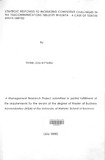| dc.description.abstract | Strategy responses, according to the classic organizational literature, are
organizational responses in predictable ways to the conditions that surround
them, adjusting their purpose and shape to meet market and other
environmental characteristics. Child (1972) and Weick (1977) argue that
organizations can create their own environments through choices regarding
markets, products, technologies, scale of operations, etc.
Telkom Kenya (TKL) has been subjected to intensive competition over the
past few years as a result of increased liberalization of the market. The mobile
operators, Zain (formally Celtel) and Saraficom have provided the main
competition to TKL’s voice business. With the changing business environment,
TKL has been forced to review and adjust its competitive strategy. No study
had been done specifically on TKL’s strategic responses to the highly
turbulent environment, after the initial five exclusivity granted to it by the
regulator expired in 2004. This study sought to determine the environmental
challenges facing TKL and the strategic responses that it has adopted, to
effectively fight competition. Primary data was collected from key senior
management TKL staff, handling strategy aspects of the company, via
personal interviews. Thereafter, the content analysis technique was
employed to analyze the data.
The researcher found out that TKL has been battling with adverse
environmental challenges. The major internal challenges are culture change
and harmonization of huge disparities in staff remuneration. The key external
challenges are the impending unified license by the telecommunications
regulator and advanced customer needs, exceeding TKL’s current services.
The top competitive challenges are intense rivalry among the telecom
players, cheaper substitute products and high bargaining power of
customers.
TKL has responded to these challenges by enhancing it internal capability to
match the prevailing external environment via implementation of a culture
change program and adoption of a market benchmark for harmonization of
staff packages. To deal with the competitive challenges, TKL has embarked
on an elaborate technological strategy to rollout new mobile services
platform and has also embraced market penetration, product development
and market development strategies by increasing sales and promotional
activities, development of new products and recruitment of dealers in the
distribution network.
The researcher recommends a survey to be carried out across the various
telecommunications firms in Kenya, to determine their respective strategy
responses to intensified competition, for comparative analysis. | en |

